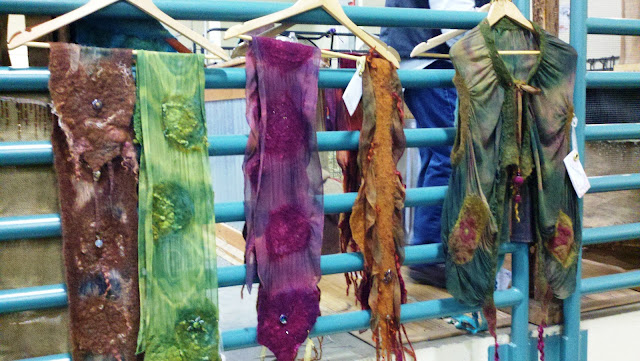Alpaca Dreamin' on a Sunday Afternoon
 |
| These scarves (and vest) were created with felted alpaca fiber and rayon and are sold by Lasso the Moon Alpaca Farm. This company also sells kits to make them |
Older and wiser now, I only had a stack of about five essays to tackle Sunday morning and a whole day to complete them. It was rainy and cold outside, and I’d already decided that I would stay in, wear pajamas, and work on some knitting projects after I’d finished correcting essays, but then the phone rang around 11:00. A friend on the other end of the line told me about a Carolina Alpaca Celebration roughly thirty miles from my home, one that had gone on all weekend and was ending that day, at 3:00 p.m. I looked at the event website , and learned that the Carolina Alpaca Breeders and Owners were sponsoring this show, where there were exhibits, competitions, vendors, and classes.
This incident highlights the very real problem I have. The thought of hundreds of alpacas in a big arena, along with fiber and other alpaca products for sale, lured me with a siren call the way the news of a new neighboring casino beckons a gambling addict. I couldn’t resist. After rousing my two boys from their beds, I told my eleven-year-old son to hurry up and eat, so that he could get dressed to go to the Cabarrus Arena with me. He wasn’t too pleased with this turn of events, but he’d been in the house almost the entire weekend, and I didn’t want to leave him glued to the TV screen while I went out.
 |
| Ruth Mogrovejo sells wonderful Latin American alpaca products. Click here to go to her website. |
After driving through a gray and wet country landscape, we made our way into the arena, where we were greeted with an excess of cuteness. Wide-eyed, living, breathing teddy bears curiously gaped at us, and sometimes hummed in unison. Others seemed to knowingly pose for the photographs I took.
I was amazed to see how many of the alpaca owners and vendors had traveled relatively long distances to attend this event—from places such as Georgia, Florida, Tennessee, Kentucky, and Virginia. Several of the vendors had machine-made or hand-made alpaca scarves, socks, fingerless gloves, and other items for sale, along with skeins of silky soft yarn and bags of processed fiber for purchase. As attending this gathering was an unplanned decision, and as I have already exceeded my yarn budget several times over this month (wait, I don’t think “budget” and "yarn have ever been juxtaposed in my thinking or writing before), I decided to forgo purchasing any expensive yarn to add to my stash, but I couldn’t resist a six dollar two-ounce braid of red merino roving. (Evidently, some alpaca farmers also raise sheep.)
 |
| I bought the red braid of roving pictured here. |
 |
| Click here to go to Happy Hills Alpaca Farm. |
Luckily, I found a local fiber source (for when I have more purchasing power) in Valerie Hietala of Happy Hills Alpaca Farm. Valerie was busy spinning some alpaca fiber, and I stopped for a moment to ask her some questions about a fleece I’d bought at the Southeastern Animal Fiber Fair (SAFF) last October. She was very helpful and gave me some insight into the easiest alpaca fiber to spin. Apparently, spinning Suri (the type of fiber I’d bought at SAFF) can be challenging. Valerie also showed me some baby-soft yarn from one of her male alpacas. Once the weather gets warmer, and I work my way through a bit more of my stash, I plan to visit her farm store, which is located only a few minutes from my home.
I also learned at this event that many yarn stores do not stock local alpaca fiber, because the cost of shipping it from the farm to a processing plant and then back again makes the yarn prohibitively expensive for many shop owners to sell and make much of a profit. There is a wealth of online alpaca yarns, sources, however, and events such as the one in Cabarrus do much to promote the appeal of alpaca fiber to fiber artists. Many alpaca owners love their hobby and their animals so much, that the financial rewards of their enterprises are secondary concerns. I understand their sentiments, as I'd love to have a few of these furry creatures someday







That is one hot lama! hehehe...
ReplyDelete